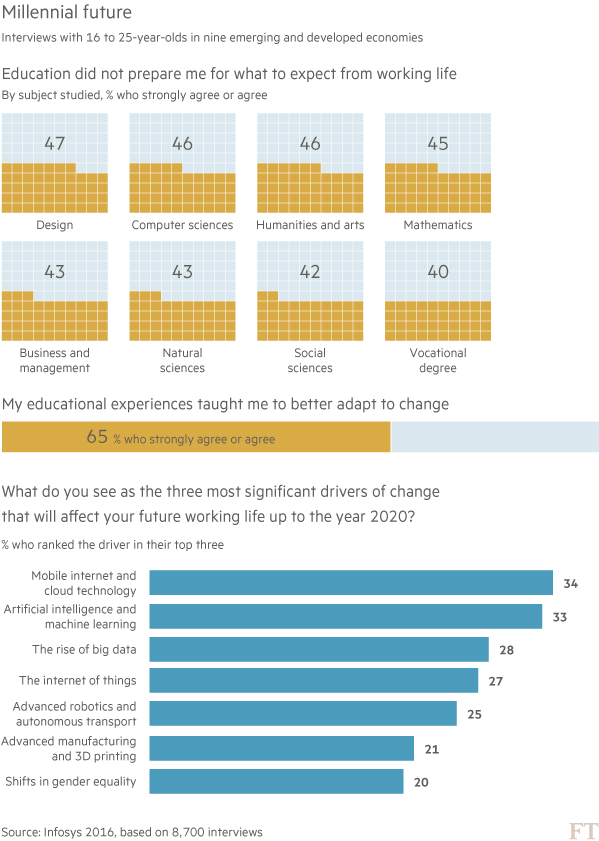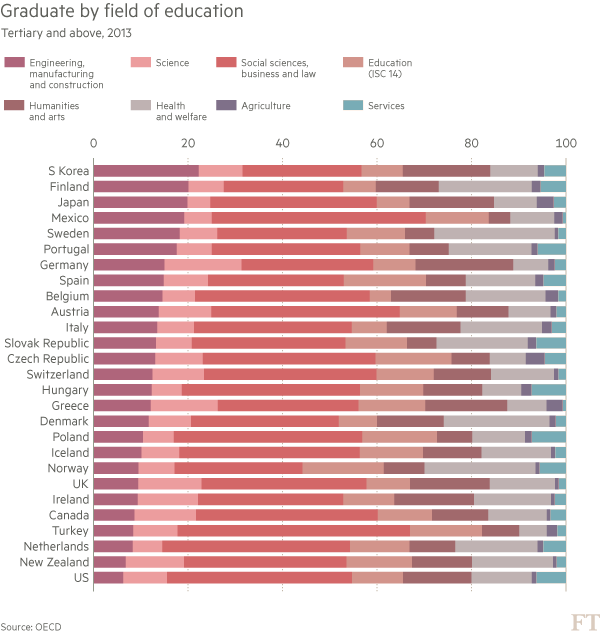Work survival in the era of automation

Roula Khalaf, Editor of the FT, selects her favourite stories in this weekly newsletter.
Roy Harold Scherer Jr worked as a truck driver on the long haul to the top of his chosen profession. He later found film stardom under the name of Rock Hudson. Michael Dell, founder of US company Dell Computers, washed plates and was a waiter in Chinese and Mexican restaurants before he landed on a career in technology.
Such humdrum tasks once allowed ambitious people to earn cash en route to the top. For others, they were full-time jobs. But such low and semi-skilled jobs are increasingly in danger of being wiped out by the coming robotics age. Dish washing has long been automated and truck driving may be consigned to the rear-view mirror when driverless vehicles hit the streets.
This month’s Connected Business asks what workers will need to do to make their careers robot proof. But it is open to debate what this technological revolution will mean, especially for employers and workers in sectors requiring what are seen as a lower order of skills.
Tourism, traditionally viewed as a provider of low-paid, part-time, customer-facing jobs, is one industry experimenting with robots in human roles, such as receptionists.
Stephen Page, a professor of tourism management at Bournemouth university in the UK, says wide adoption of robots will depend on how and where in the world they are used. A survey by TravelZoo, an online media company, found regional variations in human acceptance of robots. Chinese tourists were the most comfortable with the idea of their use in travel, French and Germans were the least at ease.
Prof Page says: “We already know planes are flown by computer, so to a certain degree you can say a robot is flying it with human interaction to provide the safety element.”
Transport is another sector where jobs are at risk. Rachel Aldred, senior lecturer in transport at Westminster university in London, says driverless buses could improve life for staff and passengers. Past welfare studies found bus driving was stressful and unhealthy because drivers are sedentary. Being a bus conductor, however, was better for health and a less stressful occupation.
“Since then we’ve got rid of conductors but kept bus driver jobs,” Ms Aldred says. “So if you’re looking at employee health it is the wrong way round.
“Potentially, having driverless buses opens the opportunity to reinstate those conductor jobs, and to improve service quality to passengers,” she says. “It will also improve employee health.”
She says a more negative outcome would be to get rid of the driver as well as the conductor.

That choice could come down to how much money companies can save by employing robots and how unions and workers respond to such changes.
But Ms Aldred says automation may even provide more work for people. “Jobs do change all the time, just because you have a technological change doesn’t necessarily lead to a shrinkage in jobs, it is just different skills are required.”
Prof Page is also optimistic: “There is a role for human creativity, to create more forms of human employment so you’re constantly generating new areas in the job market.”
Ms Aldred adds that the way some jobs are classified as low skilled and low waged may need to change. Roles in call centres, shops and care require complex skills, for instance. “We need to improve the quality of these jobs, particularly if we’re going to have more of them.”

States and education systems, meanwhile, may need to better prepare young people for the future. Infosys, a multinational technology company, last month published a study of youngsters aged 16-25 from nine developed and emerging economies. This found that a third of millennials thought that artificial intelligence would be a big cause of change in their future careers.
As Carl Benedikt Frey, co-director of the Oxford Martin programme on technology and employment, told the FT in a recent interview: “Any loss of equality [through fewer jobs] would be a failure of policy, not technology.”
Comments